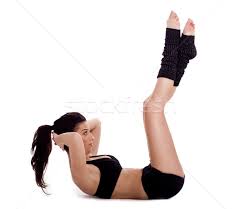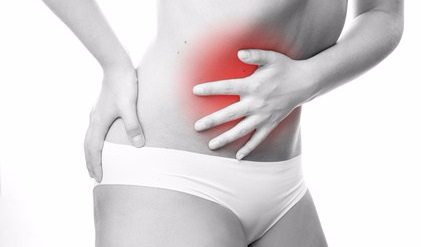 I’ve been having a lot of problems with cramping up in my lower abdomen while running lately. It’s been pretty bad. The pain comes when I’m between one and two miles into my run and it’s a pretty debilitating pain. It feels very similar to a menstrual cramp, and sometimes I just cannot work my way through the pain and have to stop my running and sit down for a while wherever I am. Usually it goes away within a minute or two of stopping activity, but sometimes it lasts longer than that. As you can imagine this is not the ideal situation for a person who is trying to participate in multiple races over the year.
I’ve been having a lot of problems with cramping up in my lower abdomen while running lately. It’s been pretty bad. The pain comes when I’m between one and two miles into my run and it’s a pretty debilitating pain. It feels very similar to a menstrual cramp, and sometimes I just cannot work my way through the pain and have to stop my running and sit down for a while wherever I am. Usually it goes away within a minute or two of stopping activity, but sometimes it lasts longer than that. As you can imagine this is not the ideal situation for a person who is trying to participate in multiple races over the year.
Of course, I turned to google searching when it came to trying to figure out why I was experiencing so much pain during every single one of my runs. However, when searching for “menstrual like cramps while running,” I wasn’t very successful in figuring out WHAT was going on. It became very clear to me that many, many women experience this issue when it comes to running, but none of them really seemed to have an answer as to why the pain occurs. Some suggested it had to do with endometriosis, others thought it had to do with irritable bowel syndrome, while others simply thought it was dehydration. Whatever the case, no one had an answer as to what to do about it and how to help.
So the next place to go looking for answers was my doctor’s office. I figured if it was any of the above things, I would need some sort of test done. Long story short, I came back kind of disappointed from my surprisingly short doctor appointment with an attempt at an answer, although I’m not really convinced it’s the tell all answer.
So today, I want to tell you guys about my diagnosis from the doctor, what she told me I have, what it means for me, and what I’ve tried to do about it. Next week, I’ll tell you what I actually think is the cause for my cramping and what I’ve done about that. And if you guys are experiencing similar issues, you can decide for yourself what you think the problem may or may not be.
Exercise-Related Transient Abdominal Pain (ETAP)
That’s the fancy term for what my doctor told me I was “suffering” from. What that really is, is a fancy term for a “stitch”, like a side stitch, but apparently it can happen on any area of the abdominal region, though the lateral aspects of the mid abdominal (or the sides of the mid abdomen) is the most commonly affected area. It’s said to feel like a sharp, stabbing pain when it is at its worst, but a dull ache when it’s less severe.
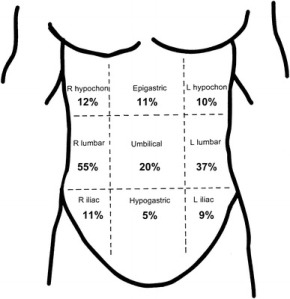
Areas affected by ETAP and commonness of affliction (.ncbi.nlm.nih.gov)
It’s especially prevalent in activities that use a lot of torso movement such as running or horseback riding. In fact, 70% of runners report experiencing the pain at some point in their lives. And although it is most common in young athletes, not even experienced runners are immune to the sensation of feeling ETAP.
A few research studies have taken place looking into the pain, severity, and prevalence of Exercise-Related Transient Abdominal Pain.
In about 80% of all cases of ETAP, the pain was localized in one area of the abdomen, reaching everywhere from the lower abdomen to the sides near the ribcage. Right side pain is reported to be twice as common as it is on the left side. Again though, pain can be present anywhere on the abdominal area.
What causes Exercise-Related Transient Abdominal Pain?
It’s actually not known exactly what causes ETAP. There are a few theories out there that researches think may contribute to the pain, but it’s not known completely what is happening to cause the body to cramp up and ache so severely during exercise.
Several of the theories include inadequate blood supply to the diaphragm, stress of the supportive ligaments that attach abdominal organs to the diaphragm, inadequate blood supply to the intestines, compression of the celiac artery, aggravation of the spinal nerves, and irritation of parietal peritomeum (lines the abdominal and pelvic cavities).
Of these theories, researchers believe that the latter is the most likely cause of the pain, as the pain described from those with ETAP most similarly relates to this. Similarly because of the stretch of the lining (from abdominal cavity to pelvic cavity) this pain could occur in many areas of the abdomen.
In fact, a study by Mole et al. found that people who suffer from ETAP actually have thinner transverses abdominis and less functional core stability than those who do not experience ETAP, which suggests the above may be to blame.
However, more research is needed to determine if this is actually true in all cases.
I am going to link the research article that I was given by my doctor which talks more about Exercise-Related Transient Abdominal Pain and all the research that took place about it. This article goes deeper into information about each of these theorized causes and why they were each proposed. If you’re curious about the biology of what is happening, I suggest you check it out!
How often does ETAP occur?
Exercise-Related Transient Abdominal Pain is different for every runner. According to a study of 600 athletes by Morton and Callister, ETAP occurred in less than 10% of physical activities. 82% of these people indicated that the pain occurred no more than 20% of the time. I’m personally really jealous of these people, because I would say I experience the pain around d75% of the time. Yuck!
Who gets ETAP?
As I said earlier, no one is immune to Exercise-Related Transient Abdominal Pain. All athletes can experience it no matter age or sex. However, several studies have shown that ETAP is more common in individuals younger than 40. Both occurrence and severity seem to decrease with increasing age.
There isn’t any definitive proof that shows whether ETAP is more common in men or women, however some studies seem to slightly suggest women experience ETAP more often. It’s also very important to note though that these studies don’t find this statically significant considering the small fraction of women studied.
What else might affect ETAP?
- Activities where torso movement is common such as running or swimming
- More intense exercise, although less intense exercise like horseback riding may cause ETAP as well
- Consuming food or drink before exercise
- Ingestion of hypertonic fluid (Studies suggest that isotonic solution during running provokes the least amount of ETAP cases. Water, a hypotonic solution came next in number of ETAP cases, while hypertonic solution was associated with the most cases of ETAP.
What can I do about ETAP?
If you suffer from Exercise-Related Transient Abdominal Pain, don’t fear, it might not be the actual end to your exercise career. At least, to this day I hope not. There are actually several things that you can do to help yourself get over this little road bump in your aims to become a better athlete.
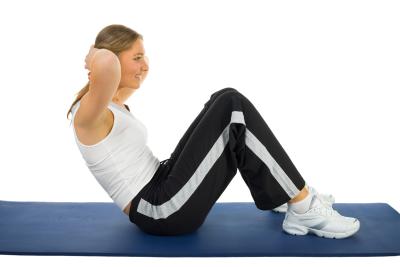 For starters, you should avoid eating and drinking large volumes (or any volumes) at least 2 to 3 hours before exercise. Hypertonic beverages should be avoided all together but small amounts of isotonic or hypotonic fluids can be regularly consumed during exercise to help combat ETAP.
For starters, you should avoid eating and drinking large volumes (or any volumes) at least 2 to 3 hours before exercise. Hypertonic beverages should be avoided all together but small amounts of isotonic or hypotonic fluids can be regularly consumed during exercise to help combat ETAP.
You should also try to support and restrict torso movement when working out. It’s suggested that wearing a wide supportive belt around the waist can help. However, the biggest suggestion is to work on core strengthening to prevent ETAP all together. Research also suggests to improve posture while exercising.
Thankfully, ETAP has been shown decrease with experience and fitness level so you may actually be able to work your way out of it with time and patience.
For me personally, I wear a belt now and I run with a water bottle, making sure to take in regular amounts of fluids while I run. I was able to compete in my last 5k with minimal issues, but I do plan to take a month or so off of the running to work solely on my core strength (which honestly I’ve needed to do lately anyway).
Is there anything I can do when I do experience ETAP?
When you’re experiencing ETAP symptoms the most common technique seems to be deep breathing. For some people they’re able to continue their activity and simply breathe through it, while others need to completely stop and take some time to let their breathing catch up. I personally feel like this has to do with your experience level. If you’re not a seasoned runner, this is a good time to stop and walk it off for a little bit.
So that’s the breakdown of Exercise-Related Transient Abdominal Pain. I’m honestly to this day not really sure if that’s what I have or not, and I’m not really sure if I’m ever going to be running at 100% if it is the case, but I have hope that I’ll figure this thing out and that if you’re suffering as well, so will you.
So let me know in the comments below, have you ever experienced pain that may be ETAP? What do you do about it? I’m really curious to know your own story.
And again, check out the link to the full article I was give so you can read more for yourself in you’re curious to know more!
Until next time,
Kat
 The generalized rule of thumb for calories burned running is that the average person burns 100 calories per mile of running. However, it’s easy to spot how this can be inaccurate. This doesn’t take into consideration weight, speed, or how seasoned of a runner you are. After all, let’s be fair, no 2 runners are created equal. If that was true, I’d always be able to keep pace with my friend who usually is at least 2 minutes ahead of me!
The generalized rule of thumb for calories burned running is that the average person burns 100 calories per mile of running. However, it’s easy to spot how this can be inaccurate. This doesn’t take into consideration weight, speed, or how seasoned of a runner you are. After all, let’s be fair, no 2 runners are created equal. If that was true, I’d always be able to keep pace with my friend who usually is at least 2 minutes ahead of me! There’s no 100% perfect method to calculate how many calories a person burns when running. A lot of things go into the calculations. Running watches and apps can give you generalized ideas of your calorie burn, as can online calculators, but those can also have a level of error.
There’s no 100% perfect method to calculate how many calories a person burns when running. A lot of things go into the calculations. Running watches and apps can give you generalized ideas of your calorie burn, as can online calculators, but those can also have a level of error. First, let’s talk about the three different types of workouts you might be doing.
First, let’s talk about the three different types of workouts you might be doing. Although not greatly studied, there may be some pros to sleeping after exercise. The most important being that sleep allows the body time to repair and grow muscle tissue. This is true whether you are strength training, working on flexibility, or doing cardio. Your muscles always need time to repair after a workout. Exercise in general can also make you feel tired which helps promote sleep.
Although not greatly studied, there may be some pros to sleeping after exercise. The most important being that sleep allows the body time to repair and grow muscle tissue. This is true whether you are strength training, working on flexibility, or doing cardio. Your muscles always need time to repair after a workout. Exercise in general can also make you feel tired which helps promote sleep. If your main goal is to lose weight opposed to building muscles or stamina train, fasted workouts can really benefit you.
If your main goal is to lose weight opposed to building muscles or stamina train, fasted workouts can really benefit you.
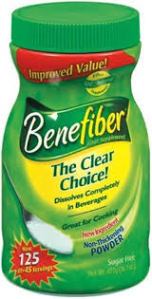 After doing a lot of research outside of what the doctor gave to me regarding ETAP, it seemed like a lot of people seemed to think that their symptoms were linked with irritable bowel or constipation. It seemed to make a lot of sense to me and tracking my own running history, it seemed like a logical explanation.
After doing a lot of research outside of what the doctor gave to me regarding ETAP, it seemed like a lot of people seemed to think that their symptoms were linked with irritable bowel or constipation. It seemed to make a lot of sense to me and tracking my own running history, it seemed like a logical explanation.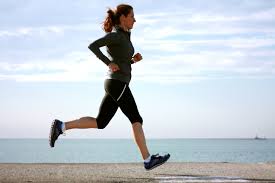 Breathing
Breathing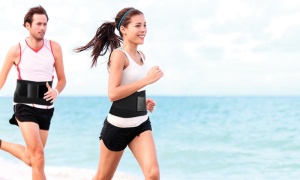 I started wearing a compression belt around my abdominal almost immediately after my doctor explained ETAP to me. It was one of the most highly recommended things to help combat the symptoms. Not only does it compress the abdomen to help alleviate the cramping, but it also helps to fix posture!
I started wearing a compression belt around my abdominal almost immediately after my doctor explained ETAP to me. It was one of the most highly recommended things to help combat the symptoms. Not only does it compress the abdomen to help alleviate the cramping, but it also helps to fix posture! Last week
Last week


 I’ve been having a lot of problems with cramping up in my lower abdomen while running lately. It’s been pretty bad. The pain comes when I’m between one and two miles into my run and it’s a pretty debilitating pain. It feels very similar to a menstrual cramp, and sometimes I just cannot work my way through the pain and have to stop my running and sit down for a while wherever I am. Usually it goes away within a minute or two of stopping activity, but sometimes it lasts longer than that. As you can imagine this is not the ideal situation for a person who is trying to participate in multiple races over the year.
I’ve been having a lot of problems with cramping up in my lower abdomen while running lately. It’s been pretty bad. The pain comes when I’m between one and two miles into my run and it’s a pretty debilitating pain. It feels very similar to a menstrual cramp, and sometimes I just cannot work my way through the pain and have to stop my running and sit down for a while wherever I am. Usually it goes away within a minute or two of stopping activity, but sometimes it lasts longer than that. As you can imagine this is not the ideal situation for a person who is trying to participate in multiple races over the year. I love working out. Honestly though, when I first started my running regimen, I absolutely hated it. I didn’t look forward to running and I had to force myself to go to the gym. Fast forward to now, I haven’t had as much time to get to the track to run and I’ve come to realize that I miss it. I don’t feel as well when I’m not running and it makes a big difference to my day.
I love working out. Honestly though, when I first started my running regimen, I absolutely hated it. I didn’t look forward to running and I had to force myself to go to the gym. Fast forward to now, I haven’t had as much time to get to the track to run and I’ve come to realize that I miss it. I don’t feel as well when I’m not running and it makes a big difference to my day.
 The most important part of working out is to make sure you are stretching and warming up before working out and cooling down and once again stretching after. This is important to aid in your muscle recovery.
The most important part of working out is to make sure you are stretching and warming up before working out and cooling down and once again stretching after. This is important to aid in your muscle recovery.
